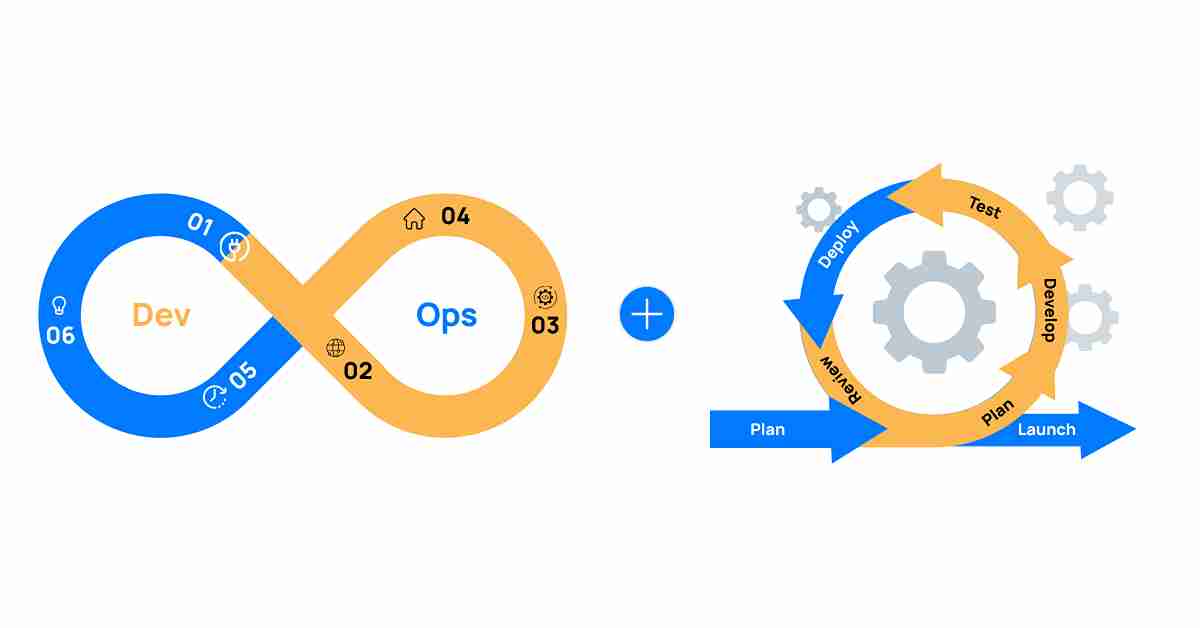In today’s fast-paced digital world, companies must innovate and deliver top-notch software quickly and reliably to stay ahead of the competition. That’s where DevOps comes into play. DevOps is a revolutionary approach that bridges the gap between software development (Dev) and IT operations (Ops), creating a streamlined, efficient workflow for building, testing, deploying, and monitoring applications. By embracing DevOps services and tools, businesses can accelerate their software delivery, increase customer satisfaction, and unlock new growth opportunities.
What is DevOps?
Let’s break down the concept of DevOps:
- Culture of Collaboration: DevOps fosters a culture where developers and operations teams work collaboratively towards a common goal – delivering high-quality software continuously. It’s about breaking down silos and promoting communication, transparency, and shared responsibility.
- Automation: At its core, DevOps involves automating various manual processes throughout the software development lifecycle (SDLC). This automation enhances speed, and efficiency, reduces errors, and frees up teams to focus on strategic initiatives.
- Continuous Integration and Continuous Delivery (CI/CD): CI/CD is the backbone of DevOps. Continuous Integration (CI) involves integrating code changes frequently and testing them automatically. Continuous Delivery (CD) automates and orchestrates the deployment process, allowing for quick updates and bug fixes.
Why Does Your Business Need DevOps?
DevOps offers compelling benefits for businesses of all sizes:
- Faster Time to Market: With DevOps, organizations can dramatically accelerate the release of new features, products, and updates, outpacing competitors and responding rapidly to market changes.
- Enhanced Quality and Reliability: DevOps’ focus on automation and testing minimizes the risk of errors, leading to more stable and robust applications.
- Improved Collaboration and Efficiency: DevOps breaks down barriers between teams, leading to better communication, and problem-solving, and reduced time wasted on handoffs.
- Increased Scalability and Resilience: DevOps practices can help businesses build applications that are highly scalable and resilient, managing traffic surges and minimizing downtime.
- Increased Customer Satisfaction: By delivering high-quality software faster, businesses can better meet customer needs, boost engagement, and drive positive experiences.
Selecting the Right DevOps Tools
A wide array of DevOps tools are available, from open-source to commercial options. Here’s a breakdown of key categories and some popular tools to consider when making your selection:
- Version Control Systems:
- Git: Git is an industry-standard distributed version control system that facilitates collaboration and efficient code management.
- Mercurial: An alternative to Git, it’s known for its user-friendliness and focus on performance.
- Continuous Integration/Continuous Delivery (CI/CD) Pipelines:
- Jenkins: A popular open-source CI/CD tool that offers flexibility and integrates well with a wide range of plugins for extensive customization.
- CircleCI: Cloud-based CI/CD platform known for its ease of use and speedy setup.
- GitLab CI/CD: CI/CD integrated into the GitLab platform, providing a seamless experience.
- Containerization:
- Docker: The de-facto standard in containerization, Docker allows for packaging and deploying applications in lightweight, portable containers.
- Kubernetes: A powerful container orchestration platform that manages container deployment, scaling, and networking.
- Infrastructure as Code (IaC):
- Terraform: IaC tool allowing users to define and provision infrastructure using code.
- Chef: Manages and configures infrastructure through code. Ideal for organizations requiring a high degree of customization.
- Ansible: Agentless configuration management tool known for simplicity.
- Monitoring and Logging:
- Prometheus: Open-source monitoring tool with a powerful query language.
- Grafana: Visualizes metrics, logs, and traces.
- Elasticsearch, Logstash, Kibana (ELK Stack): Log aggregation and analysis platform.
DevOps Services: Expertise at Your Fingertips
If you’re looking to accelerate your DevOps journey, consider engaging with DevOps service providers. These specialized companies offer a range of services:
- DevOps Consulting: Expert recommendations for strategy, tool selection, and process optimization.
- DevOps Implementation and Automation: Assist with the adoption and implementation of DevOps tools and practices.
- DevOps Managed Services: Outsource day-to-day management and optimization of your DevOps environment.
- Cloud-based DevOps: Leverage the power of cloud platforms for DevOps workflows.
- DevSecOps: Integrate security practices throughout the development lifecycle.
Conclusion:
DevOps offers a powerful approach to streamline software development and delivery. By fostering collaboration, automating processes, and implementing the right tools, businesses can achieve faster time to market, enhanced quality, improved efficiency, and ultimately, happier customers. Whether you choose to build your own DevOps toolchain or leverage professional services, embracing DevOps principles can unlock significant competitive advantages in today’s digital landscape.



